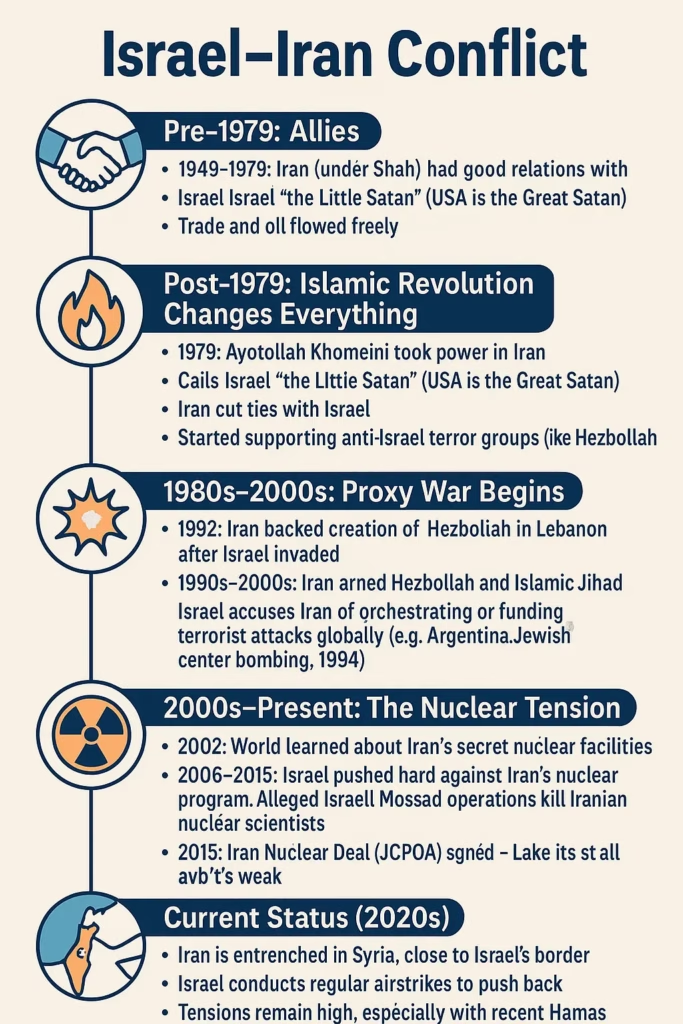Here’s both:
🕰️ Timeline: Israel–Iran Conflict
📜 Pre-1979: Allies
1948–1979: Iran (under the Shah) recognized Israel and had good relations.
Israel helped Iran develop agriculture, military, and intelligence.
Trade and oil flowed freely.
🔥 Post-1979: Islamic Revolution Changes Everything
1979: Ayatollah Khomeini takes power in Iran. Israel is now labeled “the Little Satan” (USA is the “Great Satan”).
Iran cuts ties with Israel.
Starts supporting anti-Israel terror groups (like Hezbollah).

🧨 1980s–2000s: Proxy War Begins
1982: Iran backs the creation of Hezbollah in Lebanon after Israel invades.
1990s–2000s: Iran arms Hezbollah and Islamic Jihad. Israel accuses Iran of orchestrating or funding terrorist attacks globally (e.g., Argentina Jewish center bombing, 1994).
☢️ 2000s–Present: The Nuclear Tension
2002: World learns about Iran’s secret nuclear facilities.
2006–2015: Israel pushes hard against Iran’s nuclear program.
Alleged Israeli Mossad operations kill Iranian nuclear scientists.
2015: Iran Nuclear Deal (JCPOA) signed. Israel opposes it, saying it’s weak.
2018: Trump withdraws from the deal, with Israel’s support.
Ongoing: Cyberwarfare, assassinations, shadow strikes, attacks on tankers, Syria airstrikes.
🧭 Current Status (2020s)
Iran is entrenched in Syria, close to Israel’s border.
Israel conducts regular airstrikes to push back.
Tensions remain high, especially with recent Hamas and Hezbollah escalations, which Israel links directly to Iran.
✡️ Jewish Perspectives on Peace and War
🕊️ Peace:
Judaism prizes peace deeply. The word “Shalom” (peace) is a core blessing and greeting.
The Torah and Talmud speak of peace as a divine goal:
“Seek peace and pursue it.” — Psalm 34:14 “The world stands on three things: truth, justice, and peace.” — Pirkei Avot
Jewish teachings encourage:
Reconciliation with enemies (when possible)
Ethical behavior even during conflict
Protection of innocent lives
⚔️ War:
Judaism allows military action in self-defense, and even requires it if a community is threatened.
The Talmud defines two types of war:
Milchemet Mitzvah: Obligatory war (e.g., self-defense)
Milchemet Reshut: Optional war (requires religious and civic approval)
Israel’s military doctrine reflects these ethics:
Rules of engagement
Targeting to avoid civilian harm
Internal legal review of operations (though debated)
🧠 Summary
The Israel–Iran conflict is political, ideological, and strategic — not religious.
Jews are not “eager” to fight but deeply shaped by history of persecution and survival.
Judaism’s spiritual heart is peace, but its reality in Israel is shaped by the need for defense.